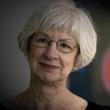In 1899, Samuel Coleridge-Taylor wrote "Solemn Prelude" for Britain's Three Choirs Festival. Despite acclaim, the work disappeared for more than a century. It will receive its U.S. premiere by the Chicago Symphony Orchestra.
Wikimedia
Nobody likes to toss aside a lovingly crafted Plan A. But sometimes Plan B turns up unexpected pleasures.
Solemn Prelude, an orchestral piece by Samuel Coleridge-Taylor, is one of those happy surprises. Coleridge-Taylor was a popular British composer at the turn of the 20th century. Of mixed race and championed by the eminent composer Edward Elgar, he was the toast of Britain’s music world at the time, lauded for his dramatic cantatas based on the epic poem The Song of Hiawatha by American poet Henry Wadsworth Longfellow. In 1899, he wrote Solemn Prelude on commission for the Three Choirs Festival, one of Britain’s oldest choral gatherings. A weeklong event, it rotates annually among Hereford, Gloucester and Worcester, three historic cathedral cities about 100 miles northwest of London.
Approximately 10 minutes long, Solemn Prelude was well-received at its premiere Sept. 13, 1899, in Worcester. There were favorable reviews, and Three Choirs officials asked him to write new works for the next three festivals. But after 1899, Solemn Prelude disappeared. It was never published, and all the orchestral parts were lost. Coleridge-Taylor’s star faded, and money troubles set in. He died in 1912 at age 37, and Solemn Prelude was never performed again.
Until last year. Founded in 1715, the Three Choirs Festival is still going strong. Alexis Paterson, its current chief executive, hit upon the idea of resurrecting Coleridge-Taylor’s forgotten piece for the 2021 festival. She tracked down his original score in London’s British Library, a new score was created and Solemn Prelude had its second performance July 27, 2021, once again in Worcester. Now the work will receive its U.S. premiere when Riccardo Muti conducts the work on concerts Sept. 22-27 to open the Chicago Symphony Orchestra’s 2022-23 Season.
None of this would have happened without the COVID-19 pandemic.
“COVID happened, and we all had to cancel all sorts of things,” said Paterson said wistfully in a recent interview. “Our original plan for the 2020 festival had a concert that was looking back at the 1899 festival.”
That 1899 festival was the first time Three Choirs had presented music composed by an American, the oratorio Hora Novissima by Horatio Parker, then one of America’s leading composers. Because 2020 marked the 400th anniversary of the sailing of the Mayflower, America was in Paterson’s sights. The idea was to unleash the Three Choirs chorus in Parker’s stirring oratorio. By 2021, after the pandemic had silenced choruses around the world for a year, that idea was less appealing.
“When we were revisiting that program for 2021, we looked at that piece,” Paterson said. “We thought the chorus has had a whole year off. They have a lot [of music] to learn. It will be a bit too much to do a big, unfamiliar choral piece.”
“Instinct led me to think if it was going to be anywhere, it was going to be there. It’s our equivalent of the [American] Library of Congress. Everything that’s been published is there.” — Alexis Paterson
Taking another survey of 1899, she came across another novelty, Coleridge-Taylor’s Solemn Prelude. “I looked it up and realized I couldn’t find it. There was only a piano reduction [a score that transcribes orchestral music into a piece for solo piano].”
With a doctorate from Cardiff University, Paterson knows her way around music libraries. She found Coleridge-Taylor’s original, annotated manuscript in London’s British Library.
“Instinct led me to think if it was going to be anywhere, it was going to be there,” she said. “It’s our equivalent of the [American] Library of Congress. Everything that’s been published is there.”
Booking a research visit to the library wasn’t easy. Periodic COVID lockdowns caused the cancellation of Paterson’s first two appointments. Not until March 2021, just four months before the Three Choirs Festival, did she finally arrive at the library’s rare books and music reading room. Once there, she discovered that Solemn Prelude had never been published.
“I thought that maybe it had been published and then lost at some point, because that happens with pieces that have fallen out of fashion.” Though there was no published score, the library had a collection of Coleridge-Taylor’s personal manuscripts, and Solemn Prelude was among them.
Thanks to 21st-century digital technology, Paterson made a copy of the 19th-century score, complete with the composer’s handwritten changes and instructions. “I basically photographed all the pages,” she said. “I scanned it on my Apple phone as well. I took three devices and copied it on everything just to be on the safe side.”
After leaving the library, she had planned to meet a staff member of the Faber Music publishing company for coffee. “He jumped at the chance to publish it, so they arranged the editing and the publishing.”
More than a dozen ensembles, including the London Philharmonic, are planning to perform Solemn Prelude. Paterson and Cristina Rocca, the CSO’s vice president for artistic administration, had stayed in touch after working together at Britain’s Bournemouth Symphony Orchestra earlier in their careers. During a visit with Paterson in Britain last year, Rocca said the CSO would be interested in giving the piece’s American premiere.
“There were lots of happy coincidences,” Paterson said with a laugh.
She estimates that the Three Choirs Festival has commissioned at least 550 works in its more than 300-year history. Unearthing Solemn Prelude has whetted her appetite for further searches.
“The piece was received really, really well in 2021,” she said. “The orchestra enjoyed playing it, and there was a lot of interest in it. It’s made us think about what we can do next. There are so many commissions in our back catalog that have only been played once or twice and were forgotten. We’re quite interested in seeing what else we can find.”


